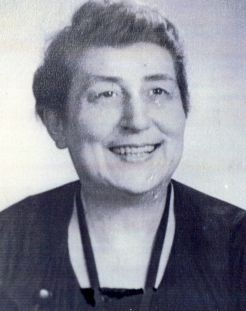|
Elizabeth Cody Johnson
Elizabeth Cody Johnson was an educator and attorney. She was born at Franklin, Tennessee (where the family had moved from Alabama) on May 5, 1895, the daughter of James Wadkins Cody and Sarah Elizabeth (Betty) Crittenden Cody. Johnson received her B.A. from Vanderbilt University and her LL.B. from LaSalle University. Johnson was admitted to the bar in 1929 and was the first woman lawyer in Robertson County, Tennessee. She was married to Judge Byron Johnson, a county, juvenile, and criminal court judge. They resided in Springfield, Tennessee. Johnson's poetry was anthologized in Margaret Nelson (ed.), American Voices, 1936: An Anthology of Poetry (New York: Avon House, 1936). The following poem, "Ad Interim," appears in The Biographical Dictionary of Contemporary Poets: The Who's Who of American Poets 260 (New York: Avon House, 1938). Ad Interim The years have moved along so swiftly now [Source: Betty Goldiamond, Elizabeth Cody Johnson's daughter (personal communication, August 20-22, 2005); The Biographical Dictionary of Contemporary Poets: The Who's Who of American Poets 260 (New York: Avon House, 1938)]
Correspondence from Betty Goldiamond, daughter of Elizabeth Cody One of my earliest memories is of awakening at night to find my mother asleep over the law books all spread out on the dining room table. Eventually, she was ready for the bar exam, and, of course, she passed. Mother got her law degree before the depression years, but she does not seem to have used it consistently to supplement the family income. In fact, she never practiced law much at all. She said she would not take divorce cases or criminal cases, so that left her such things as will-making and suits in chancery court. Eventually, after my sister and I were grown, Mother returned to school -teaching and taught English and Latin in Greenbrier, Tennessee. And then after her retirement from teaching at 65, she was appointed City Judge in Springfield, a post she held for a number of years. Mother's poem of the '30s was especially interesting to me in that it seems to express early disappointment with regard to fulfillment of her career ambitions and then a kind of reconciliation to the traditional women's role. After all, we know she was a very bright woman who had worked hard to have a non-traditional career. When she settled into the domestic life, she knew she was giving up a lot, but she found ways to be involved in the community and she was, so far as I know, gratified by her work. I have always thought of her as a happy woman who worked hard in various positions and achieved many successes along the way. I have no knowledge that my Mother left anything in the way of a journal or any significant correspondence. She was always in touch with family and others, throughout her life, and always interested in all of us, but I don't think anyone in the family collected her letters. A shame." Research Resources |
